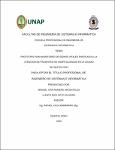Prototipo para monitoreo de signos vitales enfocado a la atención de pacientes no hospitalizados en la ciudad de Iquitos 2021

Date
2023Author
Romero Arcentales, Manuel Iván
Soto Oliveira, Llento Dick
Metadata
Show full item recordAbstract
This study was conducted in Iquitos city, whose purpose was to demonstrate the feasibility of using remote technology to obtain vital signs (heart rate, temperature and oxygen saturation) in contrast to current methods of obtaining vital signs by means of a prototype device, built based on Raspberry, arduino and sensors that allowed capturing the information of vital signs mentioned above.The research is quantitative, applied, Descriptive, with non-experimental transversal intervention with a tendency to case study with a single measurement. The study population consisted of all the records generated by the prototype to measure vital signs from July 15 to 26, the sample was non-probabilistic and was conducted through pilot tests where the indicators of precision and accuracy were recorded within the prototype variable, and for the monitoring variable, the time spent measuring temperature, SPo2 and heart rate was recorded. To determine whether the prototype was an accurate tool, the Gage R&R test with Minitab was used for each of the vital signs measured by the device, as well as the Linearity and Bias study to demonstrate that the prototype is an accurate measurement tool, and a SUS test was also carried out to calculate the degree of usability in terms of the appreciation of the medical personnel involved in the tests. The results of the experiment showed R&R values less than 20% and n > 6 which means that the tool was accurate, also P values > 0.05 and a bias within the tolerable range of measurement error according to the literature, the maximum tolerable error for the heart rate is 5bpm, temperature with 0. 5 C° and spo2 at 3%, demonstrating the accuracy of the prototype as a measurement tool, the SUS value was calculated with a total of 10 participants and the result was 83.25 out of 100 indicating that users rated our system as acceptable good. Este estudio se realizó en la ciudad de Iquitos, cuya finalidad fue demostrar la viabilidad de la utilización de la tecnología remota para la obtención de signos vitales (Ritmo Cardiaco, temperatura y saturación de oxígeno) en contraste con los métodos actuales de obtención de signos vitales por medio de un dispositivo prototipo, construido a base de Raspberry, Arduino y sensores que permitieron capturar la información de signos vitales mencionados anteriormente. La investigación fue cuantitativa, aplicada, descriptiva, con intervención no experimental transversal con tendencia a estudio de caso con una sola medición. La población de estudio se compuso por todos los registros generados por el prototipo para medir los signos vitales desde 15 al 26 de julio, la muestra fue no probabilística dirigida por conveniencia del investigador y se llevó a cabo mediante pruebas piloto donde se registraron dentro de la variable prototipo los indicadores de precisión y exactitud y para la variable monitoreo se registró el tiempo empleado para medir la temperatura, SPo2 y pulso cardiaco. Para determinar si el prototipo era una herramienta precisa se utilizó la prueba Gage R&R con Minitab para cada uno de los signos vitales medidos por el dispositivo, de igual forma se utilizó el estudio de Linealidad y Sesgo para demostrar que el prototipo es una herramienta de medición exacta, además se llevó a cabo una prueba SUS con el objetivo de calcular el grado de usabilidad en cuanto a la apreciación del personal médico implicado en las pruebas. Los resultados del experimento demostraron valores de R&R menores al 20% y n > 6, lo que quiere decir que la herramienta era precisa, asimismo valores de P > 0.05 y un sesgo dentro del rango tolerable de error de medición según la bibliografía, el máximo error tolerable para la frecuencia cardiaca es de 5bpm, temperatura con 0.5 C° y spo2 al 3%, demostrando la exactitud del prototipo como herramienta de medición, el valor SUS fue calculado con un total de 10 participantes y el resultado fue de 83.25 sobre 100 lo que indica que los usuarios calificaron a nuestro sistema como aceptable.
Collections
- Tesis [134]

